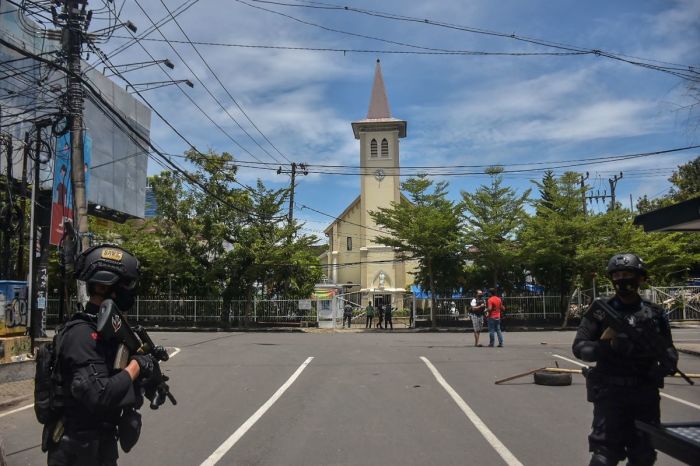Indonesian Christians face continued persecution despite official recognition of Christianity

Indonesian Christians often face harassment, discrimination, or even worse, life-threatening attacks. From hardship in the workplace, abusive and mandatory Islamic dress codes for girls, difficulties in obtaining church building permits to church raids and terrorist attacks, life for Indonesian Christians is often challenging in this Muslim-majority country.
Nevertheless, those who follow Jesus in Indonesia continue to stand firm in their faith as they share the Gospel.
A predominantly Muslim country that officially promotes religious harmony, Indonesia recognizes six religions: Islam, Protestantism, Catholicism, Buddhism, Hinduism and Confucianism. Although religions other than Islam are widely practiced throughout the archipelago, it is not uncommon for adherents to face harassment, discrimination, or, even worse, life-threatening attacks.
Indonesian Christians, especially those who have converted from Muslim backgrounds, often wrestle with societal and familial pressures. From teasing, alienation, threats, severed relationships and physical attacks to employing outside forces to perform “exorcisms” so they can return to Islam, being a Christian in Indonesia can lead to hostility and disdain.
Vania*, a civil servant of the Indonesian government, explained how she has experienced many forms of overt and subtle discrimination.
After she passed the entrance exam to serve her country in a government office, she found she was the sole Christian working there. In a purely Muslim environment, she easily stands out without a veil.
Some of her Muslim colleagues avoid her at work. Worse yet, a simple procedure to obtain a mandatory government ID turned into months of waiting. After investigating, she learned that her agency attempted to find ways to discredit and prevent her from working there since she is not Muslim. She had to submit an appeal to an independent government agency to urge them to immediately issue the ID to her. While she eventually received her ID, the process was challenging and agonizing.
As a Christian in this Muslim-majority country, Vania’s experience is not unique.
Some fundamentalist policymakers in the government try to “harmonize” appearances by enforcing conservative dress codes. Human Rights Watch (HRW), an international rights watchdog, has been conducting research on the abusive and mandatory dress codes on girls by the Indonesian government.
In schools, public offices and the workplace, girls and women are subjected to wearing hijab or jilbab, Islamic clothing that covers parts of their bodies. HRW’s 2021 report documented widespread bullying of girls and women to force them to wear the jilbab, as well as the deep psychological distress the bullying can cause.
In more than 20 provinces, girls who did not comply were forced to leave school or withdraw under pressure, while some female civil servants, including teachers, doctors, school principals and university lecturers, lost their jobs or felt compelled to resign.
The ability to assemble and worship is also becoming increasingly challenging.
For a building to be constructed in Indonesia, it needs to obtain a legal permit called an IMB (Izin Mendirikan Bangunan). The government has intentionally increased the requirements for this permit in order for a church to be built.
A congregation must obtain 90 signatures of approval from its members, as well as 60 signatures from neighbors of different religions before it can apply for the permit. For small churches, the first condition is difficult to meet, and the second condition puts their ability to assemble in the hands of potentially intolerant neighbors of other faiths.
Even if all conditions are met and the signatures are obtained, there is no guarantee that a church can be built without resistance.
GKI Yasmin, a congregation in the Jakarta suburb of Bogor, has fought for the past 15 years to construct its church building. Local extremist groups staged protests and blocked construction, prompting the mayor to revoke the already-issued permit.
Despite the subsequent Supreme Court’s two rulings in favor of the congregation, the Bogor authorities still gave in to external pressure and suggested the Yasmin church abandon its half-built building and move to a different location. The congregation had no choice but to accept this solution and ended this legal battle empty-handed.
Under these circumstances, many churches resort to renting hotel spaces or disguising residences to conduct their weekly worship and prayer meetings. Having personally visited some of these rented facilities, the experiences give one the feeling of being an espionage agent. The knowing nod from hotel staff, soundproof walls, early hours of operations and heavily curtained windows show the discreet nature of Christian worship for many Indonesians.
Being as invisible as possible is strategic, as different regions in Indonesia are home to religious extremism.
Church raids by local hardline Muslim groups occur frequently in less tolerant provinces. These groups work with local authorities to stop Christians from gathering and label their meetings as “illegal.” They also have a history of damaging church artifacts and demolishing buildings. At times, violent attacks follow to instill fear among the congregants. Commonly referred to as the derogatory term “kafir,” or apostate, Christians easily fall victims to Indonesian extremist groups’ fatal attacks.
In the last 10 years, five major terrorist attacks have been carried out against Christians, resulting in 20 deaths and more than 80 wounded. These burnings and bombing of churches are fueled by the growing influence of Islamism, along with the rise of the Islamic State. In the view of these groups, Christians should not exist.
This is the reality of being a Christian in Indonesia. Despite the discrimination Indonesian Christians face, it has not slowed down the expansion of the church. The Evangelical Church in the country is growing at an annual rate of 2.8%, with an increasing number of missionaries sent to reach unreached people groups.
*Name changed for security reasons.
Global Christian Relief (GCR) is America’s leading watchdog organization focused on the plight of persecuted Christians worldwide. In addition to equipping the Western church to advocate and pray for the persecuted, GCR works in the most restrictive countries to protect and encourage Christians threatened by faith-based discrimination and violence.



























